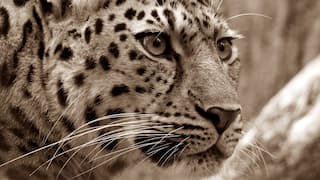Project Cheetah: Namibian Big Cat Aasha Gives Birth To 3 Cubs At MP's Kuno National Park. VIDEO
Project Cheetah completed one year in September last year. The total number of the spotted cats, including the three newborn cubs, now stands at 20.

Madhya Pradesh's Kuno National Park got three new members after Namibian cheetah Aasha gave birth to three healthy cubs. Sharing a video of the cubs, Union Forest & Environment Minister Bhupender Yadav said: "This is a roaring success for Project Cheetah, envisioned by PM Narendra Modi to restore ecological balance. My big congrats to all experts involved in the project, the Kuno wildlife officials, and wildlife enthusiasts across India."
Purrs in the wild!
— Bhupender Yadav (@byadavbjp) January 3, 2024
Thrilled to share that Kuno National Park has welcomed three new members. The cubs have been born to Namibian Cheetah Aasha.
This is a roaring success for Project Cheetah, envisioned by PM Shri @narendramodi ji to restore ecological balance.
My big congrats… pic.twitter.com/c1fXvVJN4C
Project Cheetah, which was started to reintroduce and revive the population of the big cats in India, completed one year in September last year. The total number of the spotted cats, including the three newborn cubs, now stands at 20.
In May last year, three of four cubs born to another Namibian cheetah named 'Jwala' died soon after birth. Six adults introduced at Kuno have also died since the beginning of the project, taking the total number of deaths to nine. Reacting to the mortality, officials said that no cheetah had died due to "hunting or poaching". "Generally, in other countries, poaching and hunting lead to deaths, but our preparation was so good that not even a single cheetah has died due to hunting, poaching, or poisoning, nor has any cheetah died due to human conflict," member secretary National Tiger Conservation Authority and head of Project Cheetah S P Yadav said.
India is likely to import more cheetahs soon, but this time the animals would be brought from northern Africa as the big cats from Namibia and South Africa developed a winter coat during the Indian summer. The unexpected development occurred in the cheetahs in anticipation of the African winter (June to September). Explaining the death of three of the cheetahs, an official said that the winter coat in the intense humidity and high temperatures caused itching, leading the animals to scratch their necks on tree trunks or the ground.
This, in turn, led to bruises and exposed their skin. The wounds attracted lies that laid eggs, leading to massive maggot infestation. Soon the cheetahs contracted bacterial infection and septicemia, resulting in their deaths.
Trending News
Top Headlines






































